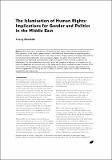| dc.contributor.author | Moustafa, Yousry | en |
| dc.date.accessioned | 2016-01-07T16:31:12Z | |
| dc.date.available | 2016-01-07T16:31:12Z | |
| dc.date.issued | 1/1/2011 | en |
| dc.identifier.citation | Moustafa, Y. (2011) The Islamisation of Human Rights: Implications for Gender and Politics in the Middle East. IDS Bulletin 42(1): 21-25 | en |
| dc.identifier.issn | 1759-5436 | en |
| dc.identifier.uri | https://opendocs.ids.ac.uk/opendocs/handle/20.500.12413/7564 | |
| dc.description.abstract | This article argues that dynamics of localising human rights, while internationalising Islam are being played out in the realm of gender politics in the Middle East. Donor interest in supporting reform initiatives directed at ‘the Muslim world’, with a focus on their ‘religious identity’, has greatly influenced the kind of signals being mediated to local organisations. Against this global trend, local human rights organisations are responding by incorporating religious clergymen in their initiatives as partners and stakeholders. This alliance between human rights actors and clergymen is leading to a re?invention of the mode of engagement with cultural issues, as the clergy play the role of mediators between the realm of the human rights and the religious. This article suggests that an Islamisation of human rights discourse and forms of engagement is occurring, but only in relation to women's rights issues, an arena conventionally mediated through religious law. | en |
| dc.format.extent | 5 | en |
| dc.publisher | Blackwell Publishing Ltd | en |
| dc.relation.ispartofseries | IDS Bulletin Vol. 42 Nos. 1 | en |
| dc.rights.uri | http://www.ids.ac.uk/files/dmfile/IDSOpenDocsStandardTermsOfUse.pdf | en |
| dc.title | The Islamisation of Human Rights: Implications for Gender and Politics in the Middle East | en |
| dc.type | Article | en |
| dc.rights.holder | © 2011 The Author. IDS Bulletin © 2011 Institute of Development Studies | en |
| dc.identifier.doi | 10.1111/j.1759-5436.2011.00197.x | en |

